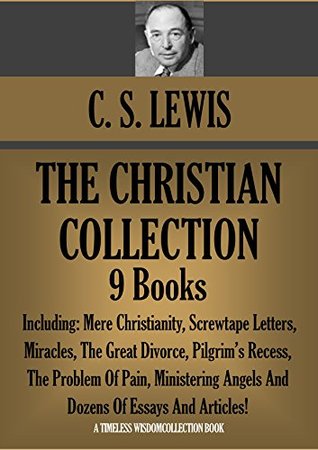- Bíblia
- Leia a Bíblia
- Versões da Bíblia
- Verso do dia
- Planos de Leitura
- Versos por Tópico
- Books of the Bible
- Imagens bíblicas
- Estude
- Comentários
- Concordâncias
- Dicionários
- Enciclopédias
- Sermões
- Bible Atlas & Maps
- BP Wiki
- Devocionais
- Devocionais de hoje
- Light of the World
- Todos os devocionais
- Inspirational Quotes
- Mais
- Picture Quotes
- Videos
- Inspirador
- Estudo da Bíblia
- O que a Bíblia diz
- Bible Q&As
- Daily Bread
- Bible by Genre
- Bible Stories
- Random Bible Verse
- Comunidade
- Store
This volume contains C.S.Lewis non-fiction books, novels, short stories and essays most known for their christian contents:
1.Mere Christanity (which in turn includes 3 books: THE CASE FOR CHRISTIANITY (BROADCAST TALKS); CHRISTIAN BEHAVIOUR & BEYOND PERSONALITY).
2.Screwtape Letters (the incredibly funny and deep letters from a senior Demon Screwtape to his nephew Wormwood, a Junior Tempter)
3. Screwtape proposes a toast (a short story, sequel to Screwtape Letters, and equally acclaimed)
4. The Great Divorce of Heaven and Hell (a short novella in which a few residents of Hell take a bus ride to Heaven, where they are met by people who dwell there. The proposition is that they can stay (in which case they can call the place where they had come from "Purgatory", instead of "Hell"); but many find it not to their taste).
5. Miracles, a preliminary study. Lewis argues that before one can learn from the study of history whether or not any miracles have ever occurred, one must first settle the philosophical question of whether it is logically possible that miracles can occur in principle.
6. The Problem Of Pain, in which he seeks to provide an intellectual Christian response to questions about suffering.
7. Ministering Angels (A short story)
8. 24 essays (a collection of the best essays written by Lewis on Christianity, Theology and Ethics)
9. Pilgrim’s Recess, the first novel ever written by Lewis, in which John, the pilgrim, in a manner like Christian in Pilgrim's Progress journeys in search of the Island of his desire, of which he has received but a glimpse, but which his longing for never quite is forgotten.
C.S.Lewis, the prolific english writer known worldwide for his "Chronicles of Narnia", and his close friendship with J.R.R.Tolkien, author of the "Lord of the Rings", was a passionate Christian apologist and this found its way into most of his books—although the excitement and humour of his stories prevented them from ever becoming boring to readers with no religious inclination.
1.Mere Christanity (which in turn includes 3 books: THE CASE FOR CHRISTIANITY (BROADCAST TALKS); CHRISTIAN BEHAVIOUR & BEYOND PERSONALITY).
2.Screwtape Letters (the incredibly funny and deep letters from a senior Demon Screwtape to his nephew Wormwood, a Junior Tempter)
3. Screwtape proposes a toast (a short story, sequel to Screwtape Letters, and equally acclaimed)
4. The Great Divorce of Heaven and Hell (a short novella in which a few residents of Hell take a bus ride to Heaven, where they are met by people who dwell there. The proposition is that they can stay (in which case they can call the place where they had come from "Purgatory", instead of "Hell"); but many find it not to their taste).
5. Miracles, a preliminary study. Lewis argues that before one can learn from the study of history whether or not any miracles have ever occurred, one must first settle the philosophical question of whether it is logically possible that miracles can occur in principle.
6. The Problem Of Pain, in which he seeks to provide an intellectual Christian response to questions about suffering.
7. Ministering Angels (A short story)
8. 24 essays (a collection of the best essays written by Lewis on Christianity, Theology and Ethics)
9. Pilgrim’s Recess, the first novel ever written by Lewis, in which John, the pilgrim, in a manner like Christian in Pilgrim's Progress journeys in search of the Island of his desire, of which he has received but a glimpse, but which his longing for never quite is forgotten.
C.S.Lewis, the prolific english writer known worldwide for his "Chronicles of Narnia", and his close friendship with J.R.R.Tolkien, author of the "Lord of the Rings", was a passionate Christian apologist and this found its way into most of his books—although the excitement and humour of his stories prevented them from ever becoming boring to readers with no religious inclination.
BUY NOW
Kindle Edition
Published June 28th 2014 by Business and Leadership Publishing
Se inscrever
© 2025 Bibleportal.com Todos os direitos reservados.

Clive Staples Lewis was born in Ireland, in Belfast on 29 November 1898. His mother was a devout Christian and made efforts to influence his beliefs. When she died in his early youth her influence waned and Lewis was subject to the musings and mutterings of his friends who were decidedly agnostic and atheistic. It would not be until later, in a moment of clear rationality that he first came to a belief in God and later became a Christian.
C. S. Lewis volunteered for the army in 1917 and was wounded in the trenches in World War I. After the war, he attended university at Oxford. Soon, he found himself on the faculty of Magdalen College where he taught Mediaeval and Renaissance English.
Throughout his academic career he wrote clearly on the topic of religion. His most famous works include the Screwtape Letters and the Chronicles of Narnia. The atmosphere at Oxford and Cambridge tended to skepticism. Lewis used this skepticism as a foil. He intelligently saw Christianity as a necessary fact that could be seen clearly in science.
"Surprised by Joy" is Lewis's autobiography chronicling his reluctant conversion from atheism to Christianity in 1931.
... Show more